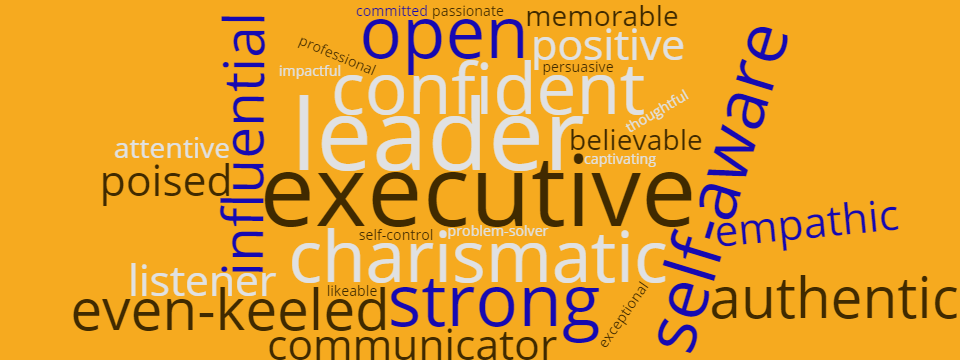
You’ve heard that executive presence drives success and progression -- but what is it really? While there’s no single definition, aspects of executive presence include charisma, poise under pressure, confidence, influence and how you solve problems. A leader’s workplace actions and behaviors, as well as how that person makes others feel, reflect executive presence too.
While this may sound similar to your personal brand, executive presence is, in fact, different. Your personal brand focuses on who you are as a professional -- what you do, what you stand for, your value and expertise, how you present yourself -- and the overall impression you make on others. Every professional has a personal brand, but not every professional has executive presence.
Executive presence speaks to the “it” factor indicative of an influential leader who possesses a certain je ne sais quoi. Consider the executive who commands an audience wherever she goes with confident and engaging conversation, or the rising senior leader who always speaks passionately and energetically about his company and what he does. These individuals are memorable, impactful and likeable -- and naturally attract a following.
How do you know if you have executive presence or are on track to develop it?
Do you captivate attention?
Speaking with self-assurance is key to strong executive presence, whether having an individual conversation, meeting with a team or presenting to a large audience. People are eager to listen to those who come across as authentic, believable and intelligent. When you lead a discussion with a confident, persuasive voice -- and pay close attention to the verbal and nonverbal cues of your audience -- you impart this positive impression. In contrast, if you speak quietly, use weak language (e.g., qualifiers and fillers) or uptalk, you undermine your authority and credibility, which leads to a disinterested audience.
Are you even-keeled and solve problems quickly?
As an executive, you carry a lot of responsibility. If something goes awry, whether it’s missing monthly targets, losing a major customer or facing product launch delays, how do you react? Do you panic, get overwhelmed or complain and lash out at those around you? Those with executive presence demonstrate strong emotional intelligence and self-control, including a calm and rational approach to solving problems with decisive and timely execution of solutions.
Is your body language open and positive?
When you speak, how you conduct yourself physically impacts your messaging. This holds true during both virtual and in-person interaction. Positive and open body language includes regular eye contact, upright posture (not slouching or hunching over), open stance (not blocking others with the angle of your shoulders), offering a firm handshake and controlling nervous habits (e.g., pacing or toe-tapping). These cues signal confidence, authority and congeniality.
For additional guidance about body language, see Why Your Body Language Matters In Business.
Do you deliver consistently?
The familiar declaration, “You have my word,” is only as good as the reputation of the person promising it. When others think of you, do they believe you are reliable, get things done and deliver as promised? Those with solid executive presence follow through on commitments. They don’t tell people they’ll do something, and then push it off or forget about it.
For more information on the importance of timely follow through, check out How Response Time Impacts Your Personal Brand.
Are you a careful listener?
Not only is executive presence about the impression you make with what you say and how you say it, it’s also about how you make others feel. When others are speaking, are you attentive and listen carefully to interpret appropriately and ask thoughtful questions? Or are you regularly distracted because you're looking at your computer or phone? Whomever you’re speaking with should feel like you value their time and opinions and have genuine interest in what they’re saying. In addition to showing engagement, it’s important to convey empathy and warmth, which enhance trust and promote positive relationships.
Does your style say “leader”?
Your dress and personal style reflect executive presence (or lack thereof) and speak to how you define your company’s culture and brand. Employees look to organizational leaders for direction, inspiration and workplace expectations (virtually and in-person). Ill-fitting clothes, out-of-date styles, worn out shoes and chipped nail polish do not appropriately represent you or the business. As an executive, not only should clothes look sharp, feel good and make you feel confident, they should fit within cultural, regional and industry norms -- which may vary -- too.
For guidance on personal styling and how it shapes the impression you make, check out What Your Style Says About Your Personal Brand.
Are you self-aware?
Executive presence requires keen self-awareness. It’s just as important to know what you don’t know, as it is to know what your strengths and expertise are. Clearly understanding your limitations is critical so you can surround yourself with others who bring different talents, skills and knowledge to the table. Strong leaders don’t rise alone; they have a robust network of others supporting their vision and working toward their goals.
As an executive, you must demonstrate strategic thinking, leadership, functional expertise and experience to take your career to the next level -- these are givens. To stand out as an exceptional leader, however, it’s essential that you possess qualities like authenticity, confidence and composure, as well as practice empathy and open communication.
These markers of executive presence (among others) separate the superstars -- those who are influential, powerful and memorable leaders -- from the otherwise highly competent and successful people.